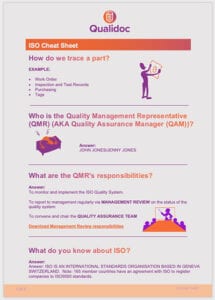The days are gone when expectations between customer and supplier could include a degree of ambiguity. The global, and yet most immediate, business environment is unforgiving of error which there is often insufficient time to correct before disaster strikes. Casual arrangements such as those expressed by Leonardo da Vinci trying to get work from the Duke, Lodovico Sforza should definitely go in the bin:
“I can construct bridges very light and strong, and capable of easy transportation, and with them pursue or on occasion flee the enemy, and still others capable of resisting fire and attack, and easy and convenient to place and remove; and I have methods of burning and destroying those of the enemy.”
(Leonardo didn’t get the job).
The supplier who is accepting a contract will need a Customer Requirement Checklist containing at least the following:
Do I have questions for my customer?
Have I considered the implied needs of the customer which have not been expressed in the Request for Proposal or Quotation?
Am I taking on more than I can handle?
Are all interested parties included in contract review, such as engineering, purchasing, quality assurance?
Is our approved subcontractor\suppliers list current and status of suppliers verified against our quality system requirements?
Do we have scheduled contract reviews until our responsibility under the contract ceases?
Do we have a risk management plan, especially for contracts involving sole source and distant suppliers, security arrangements?
Do we hold supplementary contract reviews at suitable intervals? (capacity, labour, supplies)?
Do we have experienced and qualified verification personnel to cover this contract?
Do we have a procedure for handling customer complaints?
The responsibility for making sure that contract conditions are right rests as much with the customer as with the supplier. At this stage it is easy to make the assumption that small errors can be ignored or can be compensated for at a later stage. Good business sense, let alone the new standard, requires that capturing and recording small essentials at the initial contract stage is just as important, if not more important, than capturing and recording the processes of the product or service you are offering.
You will need to consider your customer’s needs (evident and implied) at all stages of product and service delivery.
HAVE YOU SUBSCRIBED FOR THE QUALITY POLICY MANUAL? YOU NEED THIS TO HELP YOU IDENTIFY WHERE YOUR RESPONSIBILITIES LIE WITHIN THE ISO9001:2015 QUALITY SYSTEM.
